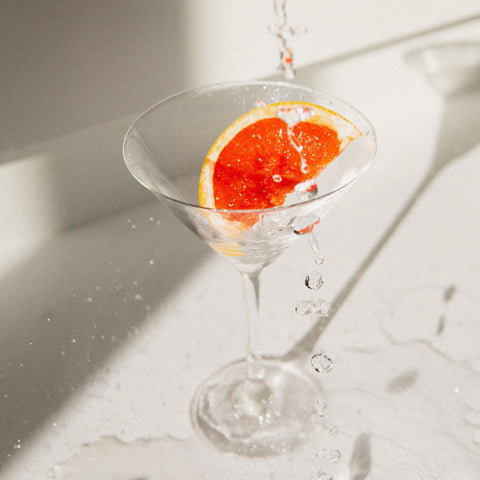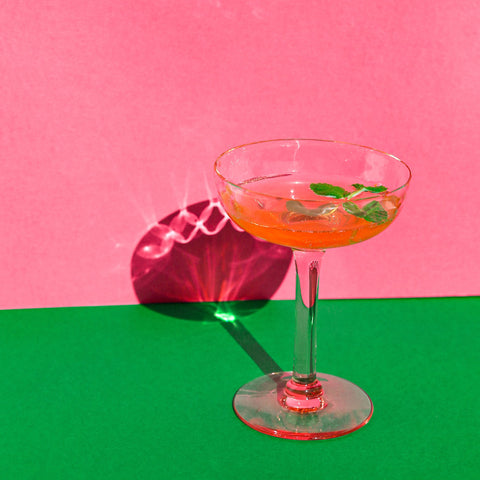If you're like most people, you probably reach for a glass of tonic water when you're looking for a refreshing beverage. Or perhaps you go for it more often when looking for a quick, easy partner for your favorite gin. But what is tonic water, exactly? And can tonic water go bad?
In this blog post, we'll answer those questions and more. We'll also look at the difference between tonic and seltzer water and the ingredients of tonic water.
So, if you're curious about tonic water, be sure to read on!
What Is Tonic Water?
Tonic water is a carbonated drink that includes several flavoring botanicals, including citrus and quinine, from the bark of the cinchona tree. Other botanicals may consist of allspice, cinnamon, elderflower, gentian, ginger, lavender, and lemongrass. Famously used in gin and tonics, tonic water is versatile and refreshing in various cocktails, nonalcoholic drinks, mocktails, and even on its own.

While the ingredients can vary depending on the brand, most tonics contain sugar, quinine, citric acid, and natural flavoring agents. Some brands also add sodium benzoate or potassium sorbate as preservatives.
Historical Background of Tonic Water
Tonic water first appeared in the 18th century as a medicinal remedy to prevent malaria. The active ingredient in tonic water, quinine, is an effective antimalarial agent. However, it has a bitter taste, so early formulations of tonic water also contained large amounts of sugar to make it more palatable. Today, most brands of tonic water use less sugar, but the distinct sweet-and-bitter flavor profile remains the same.
The Impact of Quinine
Quinine is a naturally occurring chemical extracted from red or yellow cinchona bark, which may also be referred to as Peruvian bark). The cinchona tree (scientific name, Cinchona ledgeriana) is native to South America—particularly Peru, Bolivia, and Ecuador—where it was discovered around 1633. When Europeans came across it, indigenous people were brewing tea made of the ground bark.
Quinine helps prevent malaria by killing the parasites that cause it. The indigenous peoples of South America first used the bark to treat fevers. Dutch explorers later introduced quinine to Indonesia and other colonies in the 1800s. Later, it made its way to Africa. Some say quinine was a component in fueling the slave trade and colonialism.
The British East India Company popularized adding water, sugar, and lime to quinine. Later, gin came into the mix, creating what we now know as the modern-day gin and tonic.
Want to know one more fun fact about quinine? It glows.
Rare Earth compounds called phosphors in quinine glow under certain circumstances. Quinine is fluorescent beneath ultraviolet light! Pretty neat, huh?
Does Tonic Water Go Bad?
It makes sense to think that tonic water will stay fresh forever as regular water does, but that is not the case. Just like any other food or beverage, tonic water can go bad. The good news is that tonic water tends to have an incredibly long shelf life in today's modern age.

The expiration date will vary depending on the ingredients and preservatives used, but most tonics should last for at least a year past the printed date if they're sealed tightly and stored in a cool, dry place. However, if you notice that your tonic water has changed color or flavor, it's probably time to toss it out.
Signs That Tonic Water Has Gone Bad
If you're worried about your tonic water going bad, there are a few common signs to look for before consuming. The first thing to look for is any color changes. Tonic water should remain completely clear, so if it starts to turn a pale yellow (or any other color), it's time to say goodbye.
Additionally, tonic water can go bad when it loses carbonation. If you notice the product is completely flat or diminished in its unique flavor, stop consuming it and throw it away. It's always better to err on the safe side!
Another common sign that you should not consume a product is when its container is misshapen in any way. Tonic water can go bad much faster in this case, as dented cans can cause botulism. It would be best if you tossed out any dented, rusted, leaking, or bulging can. Botulism is extremely rare, but its bacteria grow in these conditions. Bacteria can make you sick, but botulism can be fatal. Choose safety and find a fresh, new can!
Lastly, if you find tonic stored on a shelf with an expiration date of more than one year ago, do not consume it. Tonic can go bad over time despite its long shelf life.
What Is The Best Tonic Water Storage?
Store unopened tonic water in the pantry at room temperature for best results. When storing unopened bottles, try to keep them out of sunlight and in a dry place. Heat and humidity can ruin tonic water, causing it to lose its flavor and fizz. If stored properly, unopened tonic water can last nine months to a full year after its expiration date.
Once you open a bottle of tonic water, you should refrigerate it immediately and make sure its cap is tightly sealed. However, it will start to lose its carbonation once it's opened and eventually become entirely flat.
Another thought to consider is whether you've taken sips directly from the bottle or can. If so, you've introduced the tonic water to bacteria which may contaminate it and speed up the spoilage process. We recommend discarding it approximately one week after opening.
If you're not sure whether it needs to be thrown out, you can look for any of the signs above to make the right decision. Chances are your tonic water is gone bad and should not be consumed if you start to wonder. Remember, it's better to always err on the safe side!
Can I Freeze Tonic Water?
Tonic water does not require freezing, and freezing it may cause it to lose its carbonation after thawing. Freezing tonic water may also dull or change its flavor profile.
If you've opened a bottle of tonic water, store it in the fridge to preserve its quality and taste. Our advice is to consume it as soon as possible.
The Difference Between Tonic Water, Club Soda, And Seltzer
Tonic water is a carbonated drink typically contains quinine and flavorings such as citrus or herbs. It's commonly described as slightly bitter and drier than other carbonated beverages such as ginger ale. The carbonation softens some bitterness, and it's rare to find cloyingly sweet tonic water.
Seltzer water is simply carbonated water with no additional components. The main difference between tonic and seltzer is that seltzer is calorie-free and doesn't contain any added sweeteners.

On the other hand, Club soda does typically contain an additive—most commonly salt, but it can be another type of sodium ingredient too. Club soda generally is unflavored (outside of its sodium content), whereas tonic has a bold flavor.
Ideas For Drinking Tonic Water
Tonic water is mainly used as a mixer for alcoholic drinks, such as gin and vodka. However, you can also enjoy it on its own! If you're looking for an invigorating drink perfect for summertime sipping, be sure to give tonic water a shot. But let's be honest, tonic water is excellent year-round. Its flavor is both timeless and seasonless!
Mocktails & Coffee
It's terrific when paired with gin, but it also pairs well with fruits and herbs to make a refreshing summertime mocktail—mix tonic water with an herb-infused syrup such as lavender for a sweet, floral touch. Or pour your favorite Mixly mixer over ice, top it off with tonic water, stir it, and sip a deliciously fresh mocktail.
You can also try a simple splash of lime juice in your tonic water. The tart citrus brightens the bitter flavor while adding a kick of refreshment. Tonic is also a great drink to enjoy between courses at a nice dinner as it makes for a great palate cleanser.
Any coffee fans? A standard move seen in coffee shops is to float a shot of espresso on top of a glass of water. You can also mix it with cold brew coffee for a refreshing afternoon pick-me-up.
Making Cocktails With Tonic Water
If you're more interested in how tonic water can go well with your favorite spirit, your options are endless. Tonic water is famously mixed with gin but can also be paired with any number of liquors like vodka or whiskey. It can also blend well with fortified wines like sweet vermouth. For drinkers who enjoy a drink with added bitterness, pairing tonic with bitter spirits such as Aperol and Campari can create the ultimate aperitif.
Tonic often appears in simple recipes with minimal ingredients in mixed drinks and cocktails. Common flavor pairings are citrus and berries, but it's also an excellent alternative to sweeter sodas found in some cocktail recipes.
Final Thoughts? Tonic Water Can Go Bad.
While tonic water has a fascinating and lengthy history, its shelf life is unfortunately not the same. Tonic water can go bad, so be sure to keep an eye out for dents or rusts on containers as well as any discoloration. If you're unsure whether it needs to be tossed, always choose caution and protect your health. It's worth repeating!
All that said, tonic water is a fantastic product. It started as a medicine for malaria, and now it's used across the world in cocktails and mocktails alike. Did we forget to mention it can glow? However you choose to use it, we're sure it will be a deliciously refreshing, exciting experience.
Cheers!



